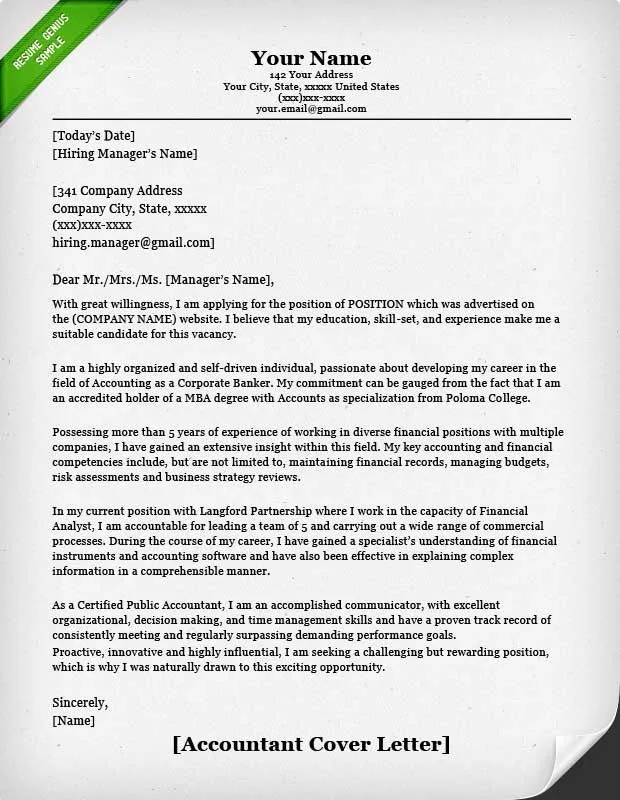What Is an Accounting Cover Letter?
An accounting cover letter is a crucial document that accompanies your resume when applying for accounting positions. Its primary purpose is to introduce you to the hiring manager, highlight your relevant skills and experience, and express your interest in the specific role and company. Unlike a resume, which provides a factual overview of your career history, a cover letter allows you to showcase your personality, explain your motivations, and demonstrate how your qualifications align with the job requirements. A well-crafted cover letter can significantly increase your chances of landing an interview, while a poorly written one can lead to your application being overlooked. Therefore, dedicating time and effort to create a compelling cover letter is an investment in your job search success. Consider it your first impression, your chance to shine, and make a memorable impact that sets you apart from other candidates.
Key Components of a Strong Accounting Cover Letter
A strong accounting cover letter comprises several key components that work together to create a persuasive and effective application. Each element plays a vital role in presenting you as a qualified and enthusiastic candidate. It is essential to include all these elements to ensure that your letter is well-structured, informative, and engaging. The following sections will guide you through each of these elements, providing insights and examples to help you craft a cover letter that stands out. From providing contact information and the date to incorporating a tailored opening and closing, each part contributes to the overall effectiveness of your application, helping you make a positive first impression and ultimately increasing your chances of securing an interview.
Your Contact Information and Date
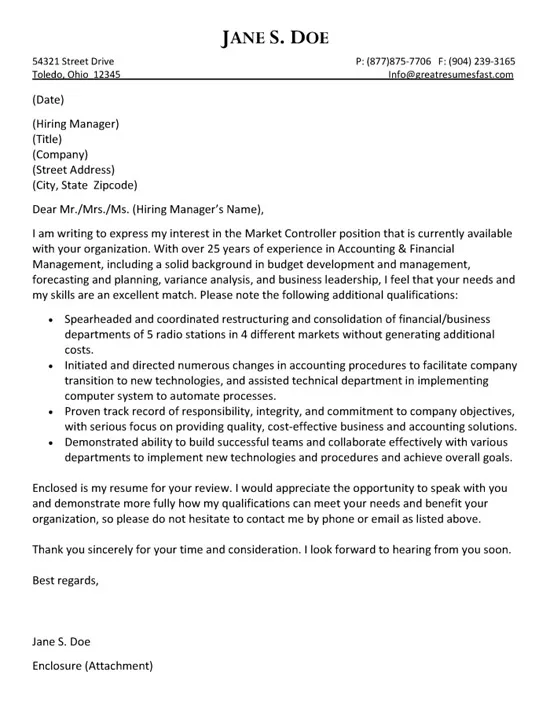
At the top of your cover letter, include your full name, address, phone number, and professional email address. This information should be clearly visible. Also, include the date on which you are writing the letter, formatted appropriately (e.g., Month Day, Year). This basic information allows the recruiter to easily contact you and keeps your cover letter organized and professional. Ensure the email address is professional; avoid using nicknames or informal language in your email address.
The Recipient’s Information
Below your contact information and the date, include the recipient’s details. This typically includes the hiring manager’s name, title, the company name, and the company’s address. If you can’t find the hiring manager’s name, research the company website or LinkedIn to identify the appropriate contact person. Addressing the letter to a specific person shows that you’ve done your research and are genuinely interested in the role, making a positive impression before the reader even starts to read the letter. If you cannot find a name, then address to Hiring Manager.
Professional Greeting
Start your cover letter with a professional greeting. The most common and effective greeting is “Dear [Mr./Ms./Mx. Last Name].” If you don’t know the hiring manager’s name, you can use a generic greeting like “Dear Hiring Manager.” Avoid overly casual greetings such as “Hi” or “Hello.” The greeting sets the tone for the entire letter, and using a professional greeting is crucial for showing respect and making a positive first impression. Make sure you have the correct spelling and title of the recipient.
The Opening Paragraph Grab Attention
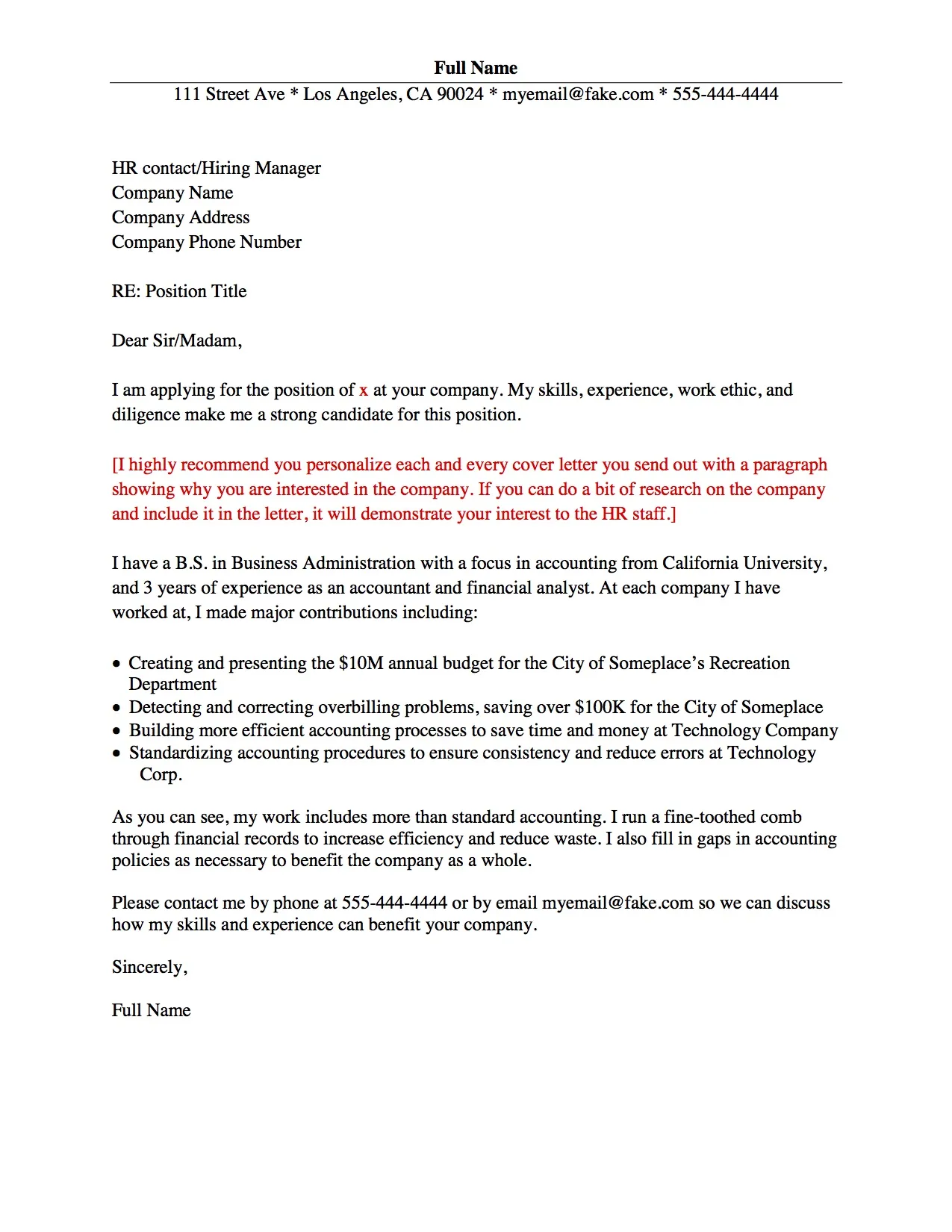
The opening paragraph is your first opportunity to grab the reader’s attention. Start by stating the position you’re applying for and where you found the job posting. Then, briefly mention something that makes you stand out or aligns with the company’s values. This could be a key skill, a relevant achievement, or your understanding of the company’s mission. The goal is to immediately capture the hiring manager’s interest and make them want to read more. Avoid generic openings and instead aim for a concise and compelling introduction that reflects your personality and enthusiasm.
Highlighting Your Skills and Experience
This is the core of your cover letter. Detail your skills and experience relevant to the accounting position you’re applying for. Instead of simply listing your responsibilities, focus on your accomplishments and the results you’ve achieved in previous roles. Use the job description as your guide and tailor your examples to match the requirements. Be specific and provide quantifiable results whenever possible (e.g., “Reduced expenses by 15%” or “Managed a budget of $X”). This section should demonstrate why you are a good fit for the role and how you can contribute to the company’s success. This is the section where you show your value.
Quantifiable Achievements and Results
Whenever possible, back up your claims with quantifiable achievements and results. Instead of saying, “Improved accuracy,” state, “Improved accuracy by 20% by implementing a new reconciliation process.” Quantifiable results demonstrate your value and provide concrete evidence of your abilities. Use numbers, percentages, and specific data to illustrate your impact in previous roles. This approach not only strengthens your claims but also shows your attention to detail and ability to measure success. It makes your cover letter much more compelling and memorable.
Expressing Your Interest and Enthusiasm
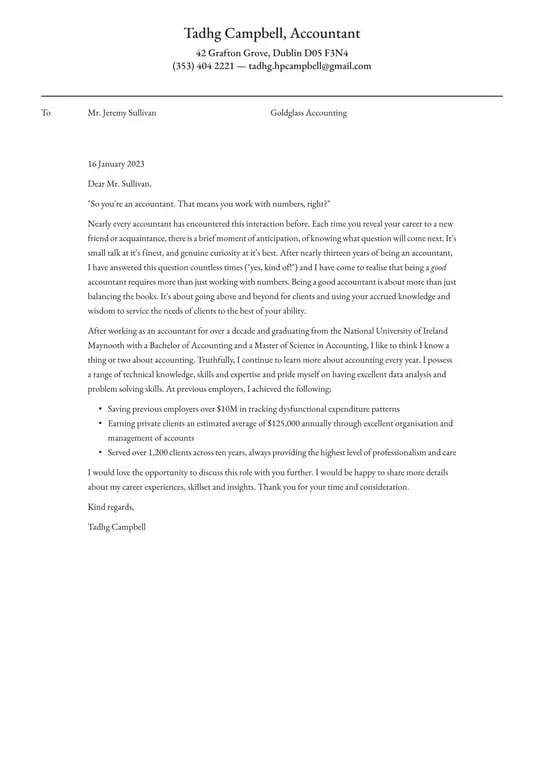
Throughout your cover letter, express your genuine interest and enthusiasm for the position and the company. Research the company and mention specific aspects that appeal to you, such as their mission, values, or recent achievements. Show that you have taken the time to learn about the company and understand its goals. Demonstrate how your skills and experience align with the company’s needs and express your eagerness to contribute to their success. Your enthusiasm will make your cover letter more engaging and show that you are truly interested in the opportunity.
Mentioning Your Personality
While maintaining professionalism, subtly inject your personality into your cover letter. This can be done by using your unique writing style or sharing a brief anecdote that reflects your work ethic or values. Avoid being overly informal, but let your personality shine through to make your cover letter more memorable. Highlighting your personality helps the hiring manager get a sense of who you are beyond your qualifications and experience, which can increase your chances of standing out.
Closing Paragraph and Call to Action
In your closing paragraph, reiterate your interest in the position and the company. Thank the hiring manager for their time and consideration. Include a call to action, such as stating that you look forward to hearing from them or that you are available for an interview at their earliest convenience. This shows confidence and initiative. End with a professional closing, such as “Sincerely” or “Best regards,” followed by your full name. This final touch leaves a lasting impression and encourages the hiring manager to take the next step.
Formatting and Design Best Practices
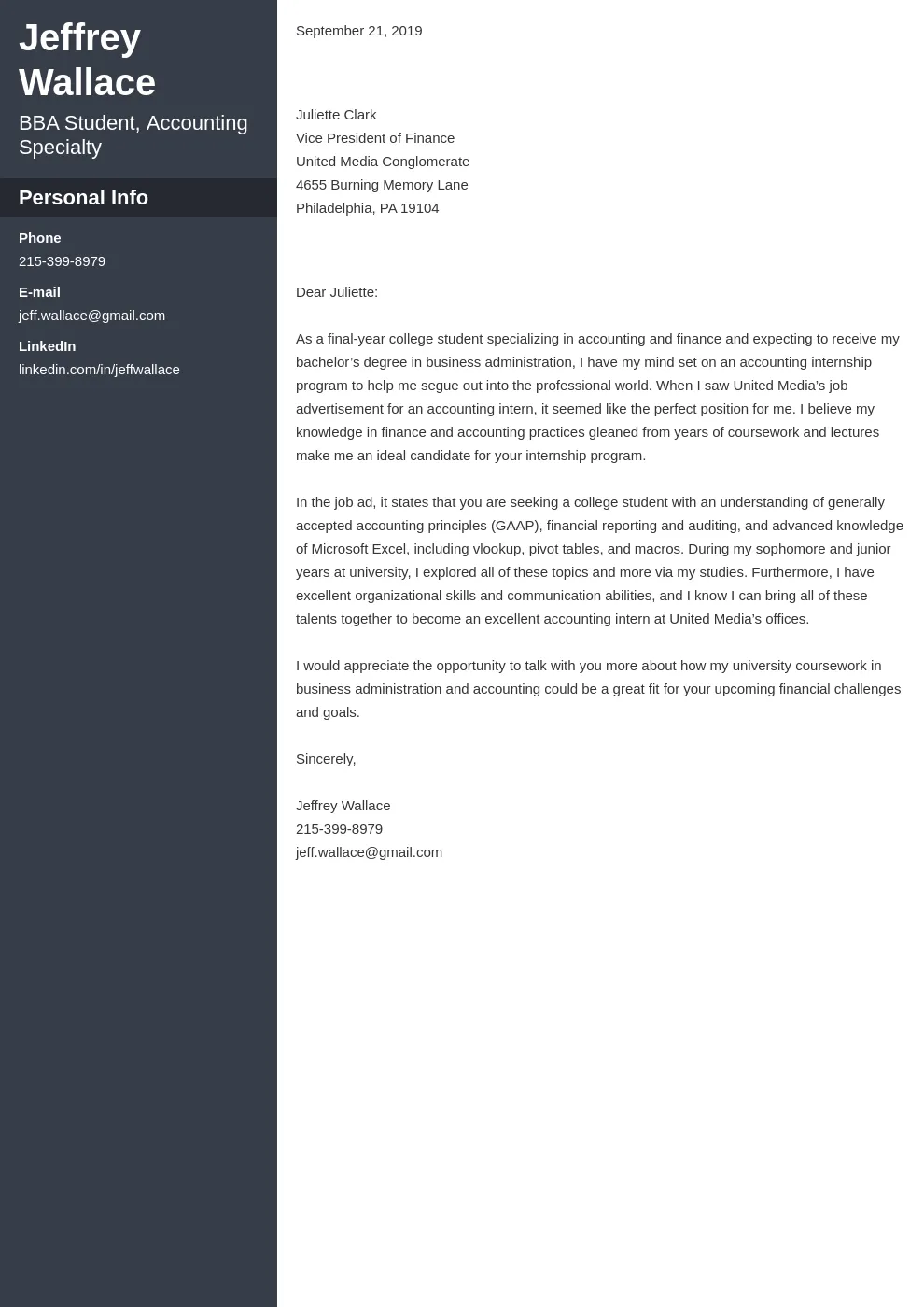
The formatting and design of your accounting cover letter are just as important as its content. A well-formatted letter is easy to read and reflects your attention to detail and professionalism. Poor formatting can distract the reader and negatively impact your application. Adhering to best practices ensures that your cover letter is visually appealing and professional. Consider all aspects, from font choice and spacing to proper margins and proofreading, to create a cover letter that stands out for the right reasons.
Choosing the Right Font and Size
Select a professional and easy-to-read font, such as Times New Roman, Arial, Calibri, or Helvetica. Use a font size between 10 and 12 points. Avoid using overly decorative or unusual fonts, as they can be distracting. Ensure the font size is appropriate for readability, making it easy for the hiring manager to quickly scan and absorb the information. Consistency in font choice and size throughout the document enhances the overall professional appearance of your cover letter.
Using Proper Spacing and Margins
Use standard margins of 1 inch on all sides of the page. Double-space between paragraphs to improve readability. Ensure consistent spacing throughout the letter. Proper spacing makes your cover letter visually appealing and easier to read. A well-spaced cover letter prevents the text from appearing cluttered and allows the hiring manager to focus on the content. Poor spacing can make your letter look unprofessional and difficult to navigate.
Proofreading and Editing Your Cover Letter
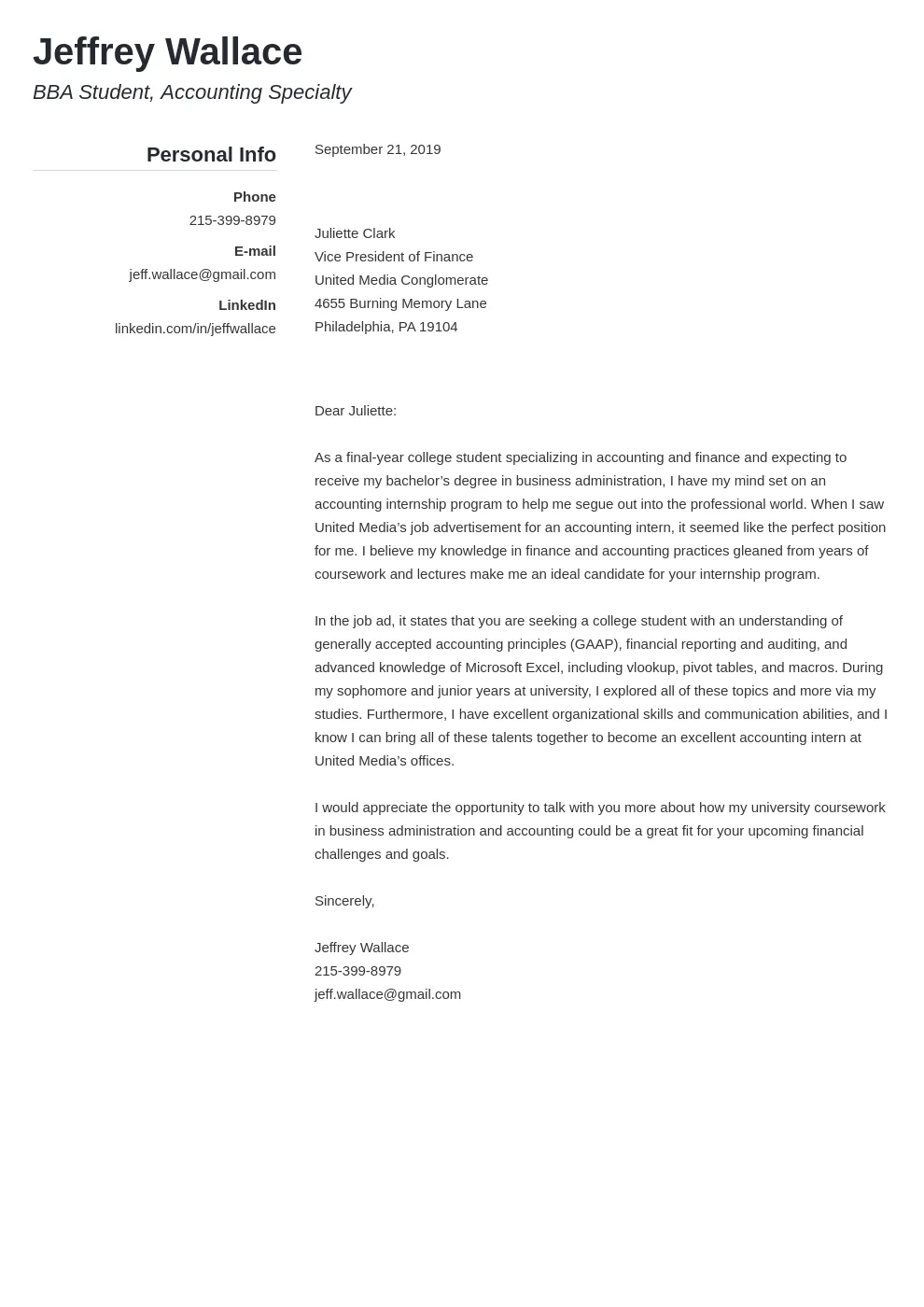
Always proofread your cover letter multiple times for any grammatical errors, spelling mistakes, or typos. A single mistake can undermine your credibility. Use spell-check and grammar-check tools, but don’t rely on them entirely. Have a friend or family member review your letter to catch any errors you might have missed. Proofreading ensures that your cover letter is polished and professional. A cover letter with errors suggests a lack of attention to detail, which is crucial in accounting.
Common Mistakes to Avoid
Avoiding common mistakes in your accounting cover letter is essential to make a positive impression. These mistakes can range from using an inappropriate tone to submitting a generic letter. Understanding and avoiding these pitfalls increases your chances of success in the job application process. By paying attention to detail and making sure your cover letter is tailored, you can show your value and secure an interview. Keep these factors in mind to ensure your cover letter is as effective as possible.
Overly Formal or Informal Tone
Finding the right tone is crucial. Avoid being overly formal, which can make you seem stiff and impersonal. Also, steer clear of being too informal, which can come across as unprofessional. Aim for a balanced tone that reflects your professionalism while still allowing your personality to shine through. The tone should match the company culture and industry standards, ensuring that your cover letter is both engaging and appropriate. Always maintain a respectful and courteous tone throughout your letter.
Generic Cover Letters
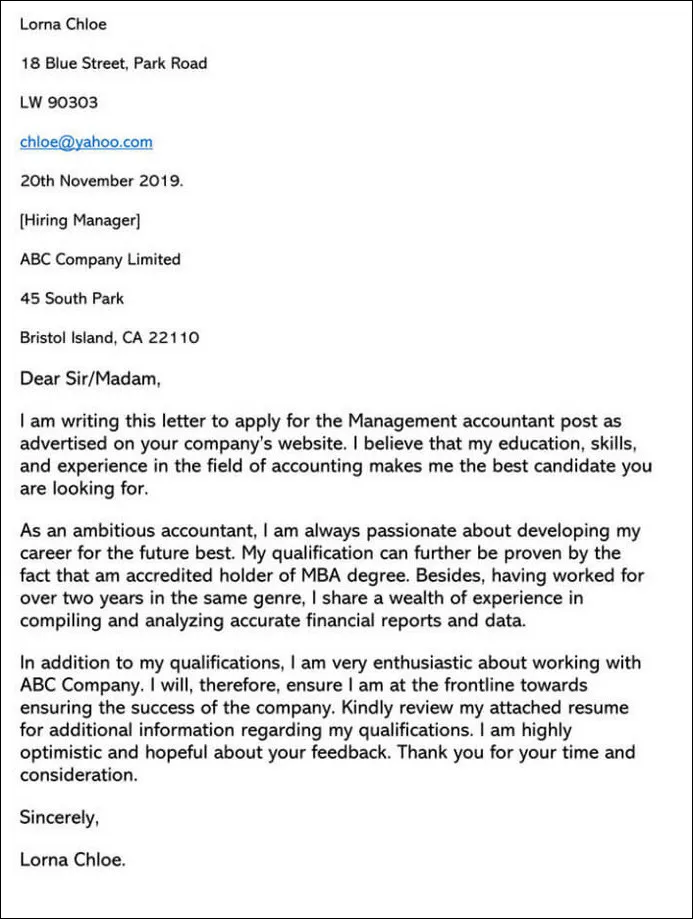
Avoid sending out generic cover letters that could be used for any job. Tailor each cover letter to the specific position and company. Research the company, understand the job requirements, and highlight the skills and experience that align with their needs. Generic letters show a lack of interest and effort, while a tailored letter demonstrates that you are truly interested in the role and have the skills to succeed. Show that you are not just sending out a lot of applications but that you are actively seeking employment.
Typos and Grammatical Errors
Typos and grammatical errors are a major turnoff. They indicate a lack of attention to detail and can create a negative impression. Proofread your cover letter multiple times, using spell-check and grammar-check tools. However, don’t rely on automated tools alone. Have someone else review your letter for errors you may have missed. Ensure that your cover letter is free of mistakes to present yourself as a polished and professional candidate. Errors can damage your credibility and make it difficult to be considered for the position.
Accounting Cover Letter Examples
Reviewing examples of accounting cover letters can provide valuable guidance. These examples demonstrate how to effectively structure your letter, highlight your skills, and tailor your content to different job types. These examples can help you understand how to present yourself to potential employers. Different formats are available for entry-level accountants, experienced accountants, and accounting managers. Adapt the examples to fit your unique skills and experience and to align with the specific requirements of the job you are applying for.
Entry-Level Accounting Cover Letter Example
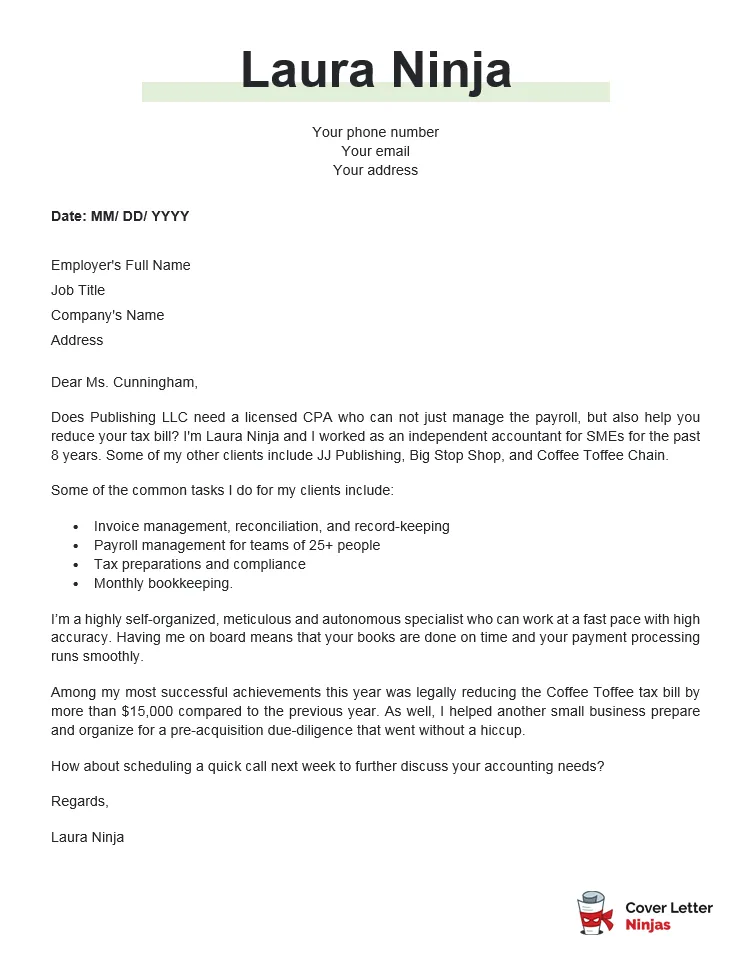
An entry-level accounting cover letter should emphasize your educational background, relevant coursework, internships, and any other experiences demonstrating your foundational accounting knowledge. Showcase your familiarity with accounting software, your understanding of accounting principles, and your strong analytical skills. Highlight any projects or assignments where you have applied your accounting knowledge. Mention your enthusiasm to learn and your eagerness to contribute to the company’s finance team. Stress your ability to work in a team environment and any relevant soft skills like attention to detail and problem-solving skills. Your goal is to display your potential as an eager and capable candidate ready to contribute.
Experienced Accountant Cover Letter Example
An experienced accountant cover letter should focus on your accomplishments and the results you’ve achieved in previous roles. Quantify your achievements whenever possible (e.g., “Reduced costs by 15%”). Highlight your expertise in areas such as financial reporting, budgeting, auditing, or tax compliance. Demonstrate your proficiency with accounting software and your ability to manage complex accounting tasks. Mention your leadership abilities, if applicable, and your experience working with cross-functional teams. Showcase how you have contributed to financial efficiency and company growth. Emphasize your in-depth knowledge and your value as a seasoned professional.
Accounting Manager Cover Letter Example
An accounting manager cover letter should highlight your leadership skills and experience managing accounting teams. Focus on your ability to oversee financial operations, develop accounting strategies, and ensure compliance with accounting standards. Detail your experience with budgeting, forecasting, and financial analysis. Showcase your accomplishments in improving accounting processes, reducing costs, and enhancing financial reporting. Mention your proficiency with financial software and your ability to lead and mentor accounting staff. Stress your strategic thinking, your communication skills, and your ability to drive financial performance. Display your leadership and your experience in achieving financial results.
Tips for Tailoring Your Cover Letter
Tailoring your cover letter to each job application is critical. This shows that you have taken the time to understand the role and the company’s needs. A tailored cover letter is much more effective than a generic one. By tailoring your letter, you increase your chances of getting noticed and securing an interview. Adapt your letter to the specifics of the role and company. Pay special attention to the job description and the skills and experiences required.
Researching the Company
Research the company thoroughly before writing your cover letter. Visit their website, read about their mission, values, and recent achievements. If possible, review their social media profiles and any recent news or press releases. Understanding the company’s culture and goals allows you to tailor your cover letter to their specific needs. Researching the company also helps you demonstrate your genuine interest in the opportunity. Mentioning specific information about the company in your cover letter shows that you’ve done your homework and are serious about the role.
Matching Skills to the Job Description
Carefully review the job description and identify the key skills and qualifications the employer is seeking. Highlight the skills and experiences you possess that match the job requirements. Use keywords from the job description in your cover letter. Provide specific examples that demonstrate your abilities and how you have successfully applied these skills in previous roles. Make sure your resume and cover letter align, highlighting your key qualifications in a clear and concise manner. The goal is to convince the hiring manager that you are a perfect fit.
Using Keywords Effectively
Incorporate relevant keywords from the job description throughout your cover letter. Keywords help your application get past applicant tracking systems (ATS) and catch the hiring manager’s attention. Use keywords naturally and integrate them into your sentences. Avoid keyword stuffing, which can make your letter sound unnatural and forced. Focus on using the most relevant keywords to showcase your skills and experience in a way that aligns with the job requirements. This will significantly improve your chances of getting noticed and securing an interview.
